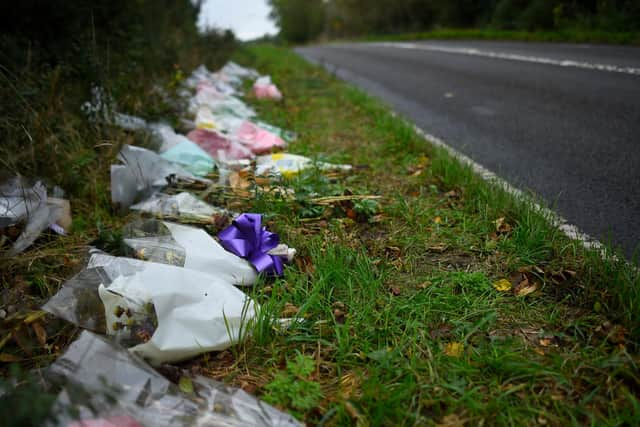What is diplomatic immunity? Meaning of legal defence and why Anne Sacoolas was granted it in the Harry Dunn case
This article contains affiliate links. We may earn a small commission on items purchased through this article, but that does not affect our editorial judgement.
and live on Freeview channel 276
The term ‘diplomatic immunity’ has risen its head once more as the lawyer for Anne Sacoolas, the suspect in the death of Harry Dunn, said her client would be willing to do community service and make a “contribution” in his memory.
Mrs Sacoolas - the alleged killer of Mr Dunn who died in a crash near RAF Croughton in Northamptonshire in 2019 - doesn’t deny fault but fled the UK and returned to the United States with her family just weeks after the incident.
Advertisement
Hide AdAdvertisement
Hide AdUpon doing so she claimed diplomatic immunity as the wife of a US spy stationed at the RAF base - but what does it mean, why does it apply in this case and can it be taken away?


Here’s all you need to know.
What is diplomatic immunity?
Diplomatic immunity is a status reserved for foreign diplomats who don’t have a British citizenship, which means they and their families cannot be arrested or prosecuted for any crime or civil case in the UK.
It is thought that more than 20,000 individuals in the UK have diplomatic immunity granted under the 1961 Vienna Convention, which also applies to diplomatic buildings, meaning enforcement officers cannot enter such premises like embassies without permission.
People entitled to immunity under the convention are still expected to obey the law.
Why did it apply in the Harry Dunn case?
Advertisement
Hide AdAdvertisement
Hide AdAs the wife of a US diplomat working in the UK, Mrs Sacoolas claims to qualify for diplomatic immunity under the convention.
It is reported that Northamptonshire Police were preparing documents to get Mrs Sacoolas to sign a waiver of diplomatic immunity before she and her family boarded a private jet to the US in the weeks following the fatal crash.
In her absence, Mrs Sacoolas was charged with death by dangerous driving but an initial extradition request from the Home Office was turned down by the US Secretary of State Mike Pompeo in January 2020.
The Crown Prosecution Service (CPS) said immunity did not apply outside of London.
Can diplomatic immunity be taken away?
Advertisement
Hide AdAdvertisement
Hide AdDiplomatic immunity can be taken away where crimes have been committed. In this instance, the Foreign Office can ask the suspect’s government to waive immunity.
The US has cooperated with a UK request, in 1940, when an embassy clerk Tyler Kent served a five-year prison sentence for sharing detailed communications between Winston Churchill and president Franklin D. Roosevelt with Nazi Germany.
The US has also made requests for a waiver when Georgian diplomat, Gueorgui Makharadze, killed a teenage girl in Washington DC while drink-driving. He served three years in prison for the five-car pile-up which caused her death.
When has diplomatic immunity been applied?
Diplomatic immunity is designed to help diplomats do their job without harassment from the police and security services - yet the system has long been controversial.
Advertisement
Hide AdAdvertisement
Hide AdIn 1984, London police officer Yvonne Fletcher was shot dead while policing a demonstration outside the Libyan Embassy. She was hit by gunfire from a first floor embassy window.
The UK government arranged for the deportation of a number of Libyan diplomats but immunity under the 1961 Vienna Convention meant none of the diplomats or their bags could be searched.
Will Anne Sacoolas lose diplomatic immunity?
Amy Jeffress, lawyer to Mrs Sacoolas, said her client had driven “instinctively” on the right-hand side of the road, causing the collision which killed Mr Dunn on 27 August 2019.
Speaking to BBC Radio 4’s Law in Action programme, Ms Jeffress said: “One aspect of this that has not been reported is that this kind of an accident, had it occurred in the United States, would not be prosecuted criminally.
Advertisement
Hide AdAdvertisement
Hide Ad“In the United States, these cases are only prosecuted where there is evidence of recklessness that rises to the level of close to intent - drunk driving, distracted driving, a hit-and-run situation or excessive speeding. But there was none of that here.”
Mr Dunn’s mother Charlotte Charles said: “In this country we do not get to advise our CPS as to what they hand down, we don't get to influence the judge and jury in any way.
“She may want to do community service and there is nothing we can do to influence that, she has to go through the UK justice system - which is one of the fairest in the world - they will decide.
“She just needs to come back and get it over and done with.”